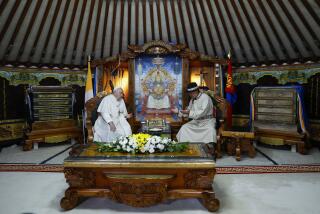Pope Gives Vision of Post-Cold War World : Baltics: He tells Latvian scholars the democracy replacing communism must be safeguarded by Christian principles.
- Share via
RIGA, Latvia — In a landmark address to the scholars of a newly free university in the former Soviet Union, Pope John Paul II on Thursday sketched his vision of a post-Cold War world in which communism would be replaced by democracies safeguarded by Christian moral principles.
“The first principle of the church’s social teaching, from which all others derive, is that the center of the social order is man, considered in his inalienable dignity as a creature made ‘in the image of God.’ The value of society comes from the value of man, and not vice versa,” the Pope told 1,400 Latvian intellectuals gathered at the University of Riga.
Choosing the Latvian language for some of his most profound remarks on a weeklong visit to the three Baltic republics, the Pope cautioned against aping capitalist countries. Instead, he urged thinkers of a nation emerging from half a century of Soviet rule to become “pilgrims of truth” in building a post-Communist society on moral foundations.
John Paul’s elaboration of his church’s social doctrine underscored his conviction that nations emerging from communism profit little if they do not build strong moral dimensions into the political and economic structures they create to replace it.
Latvia, like neighbors Lithuania, which John Paul visited earlier this week, and Estonia, where he goes today, is embarked on an audacious but perilous search for ideas and institutions with which to replace Marxism and its command economy.
His political views are of particular moment to leaders of countries that once lived behind the Iron Curtain because the Polish Pope casts a giant shadow in Eastern Europe: He is one of the important reasons that the curtain collapsed.
His visit also comes at a key juncture for a 12,500-student university that has known little academic freedom in its 74 years.
“We are still on the way between democracy and anti-democracy, between religious and anti-religious,” university rector Juris Zakis told the Pope.
In his speech, John Paul stressed that the church does not promote any particular political or economic doctrine and noted that Roman Catholic social doctrine is not merely a substitute for capitalism. Although the church condemns communism, he said, “. . . it has always distanced herself from capitalistic ideology, holding it responsible for grave social injustices.”
The Pope said that when a person’s life is without a frame of reference that includes God, “he becomes little more than a drop in the ocean, and his dignity, no matter how sincerely acknowledged and proclaimed, loses its most solid guarantee.”
John Paul listed six requirements his church considers “essential in any policy of the state, economy and society”:
* “The solidarity which must characterize human relations.”
* “The legitimacy of private property.”
* “Recognition of the importance of work.”
* “The promotion of a human ecology, implying respect for every human person from conception to natural death.”
* “A state based on law, together with a social state which offers everyone the legal guarantees of an orderly existence and assures the most vulnerable the support they need.”
* “The value of democracy, understood as participative management of the state through specific organs of representation and control in the service of the common good; a democracy which, above and beyond its rules, has in the first place a soul made up of the fundamental values without which it easily turns into open or thinly disguised totalitarianism.”
More to Read
Sign up for Essential California
The most important California stories and recommendations in your inbox every morning.
You may occasionally receive promotional content from the Los Angeles Times.













